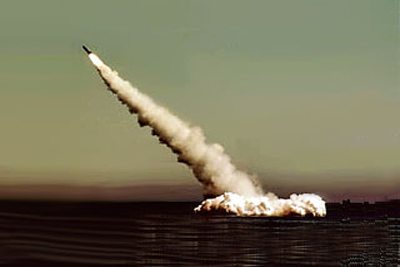The Russian military test launched its Bulava intercontinental missile Tuesday from the Yury Dolgoruky submarine in the White Sea, a major boost for the navy after a series of failures.
The test was the first such launch from the strategic nuclear submarine specifically designed to carry the Bulava missiles, said defence ministry spokesman Igor Konashenkov.
All previous such launches had been made from the Dmitry Donskoi submarine.
“The launch has been successful according to all the parameters,” Konashenkov told AFP.
The missile was fired in the White Sea in northwestern Russia and hit its target in the Kura firing area on the Kamchatka peninsula in the Pacific Ocean some 6,000 kilometers (3,730 miles) away, Konashenkov said.
Russia plans to conduct four more missile launches this year, he added. If further tests are successful, the missile can be taken up by the armed forces in late 2011 or early next year, Konashenkov said.
It was the 15th such test overall and the first this year, according to the defence ministry. Of the previous launches, only seven were successful.
In 2009, the Bulava’s main designer resigned after the failures, which defence experts called a major setback to Russia’s bid to revamp its nuclear arsenal by 2020.
The Bulava, which can be equipped with up to 10 individually targeted nuclear warheads capable of changing their flight trajectory, has a maximum range of 8,000 kilometres (5,000 miles).
Its incorporation into the armed forces is part of a wide-ranging military reform aimed at updating the armed forces’ Soviet-era structures and equipment to bring them in line with the demands of modern warfare.
The missile is designed for use with Russia’s new Borei class of nuclear submarines like the Yury Dolgoruky and Alexander Nevsky, named after key historical figures.
Analysts have previously said the vessels risk being worthless unless the Bulava works.
In late 2009, a similar missile launch ended in failure, causing spectacular images in the sky above the Norwegian city of Tromso and prompting initial speculations they were caused by a meteor, the northern lights or even a UFO.
The White Sea, the usual site for such missile tests from Russian submarines, lies close to Norway’s own Arctic region.
Defence analysts cautiously welcomed the launch, saying the armed forces had learnt from mistakes but more tests were needed.
“This is the beginning of possible success. Eight successful tests out of the 15 is a sign of hope, but nothing more than that,” defence analyst Alexander Golts told AFP.
“The Yury Dolgoruky is the first of the new missile carriers which has completed at-sea tests and is ready for use. There is no doubt this is good news for the Russian navy and the military.”










